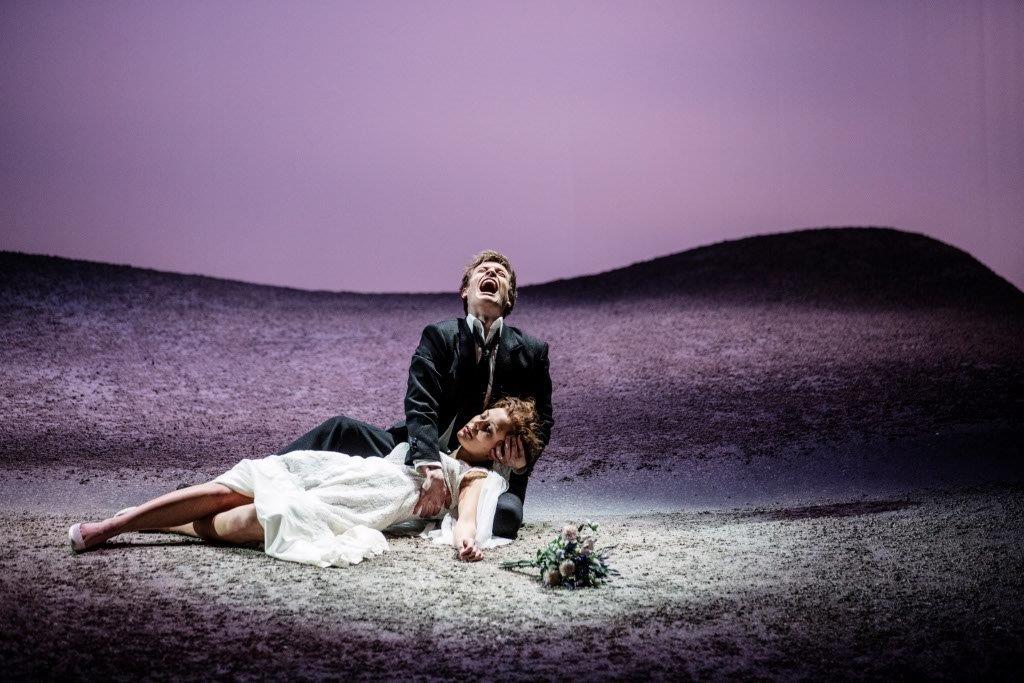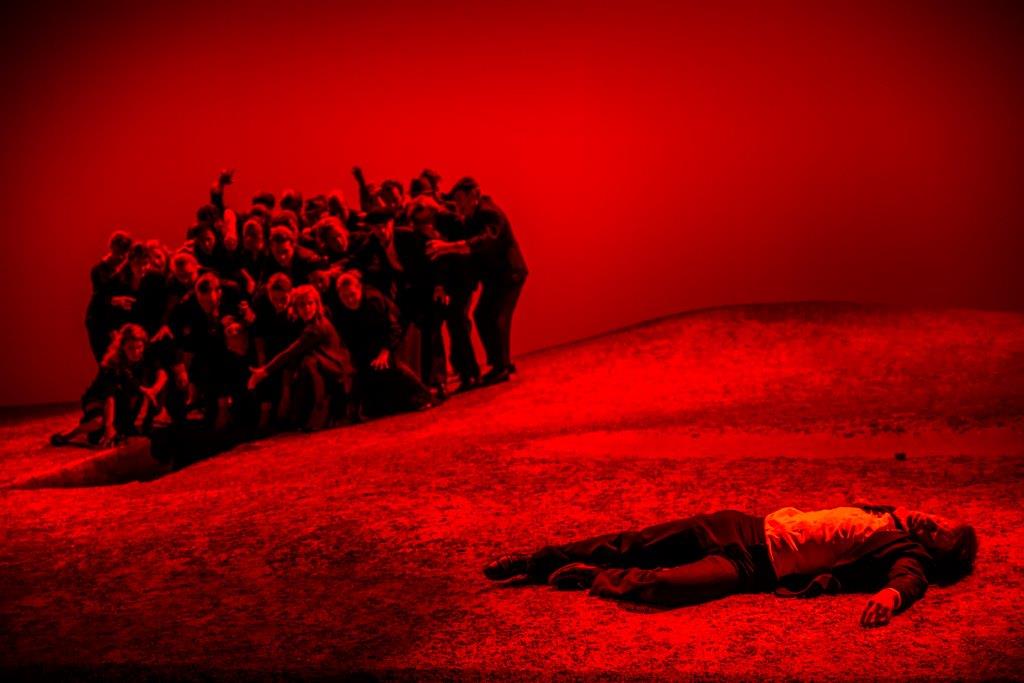Na alle ellende rond HET Symfonieorkest vormde de première van Orphée et Eurydice gisteravond (1 mei) in het Wilminktheater een verademing. Dwars tegen alle sores in realiseerde de Nederlandse Reisopera een zinderende voorstelling, die terecht beloond werd met een minutenlange ovatie. Met magische kleurvlakken, slowmotionbewegingen en mysterieus schimmenspel wekte regisseur Floris Visser het tijdloze liefdesdrama tot leven. Een must voor elke operaliefhebber.
Zoveel er aan te merken viel op de recente Macbeth van de Nationale Opera, zo weinig was er te mopperen over deze Orphée et Euryidice van de Reisopera: toneelbeeld, personenregie, muziek en uitvoering vormen één onontkoombaar geheel. Meteen al de opening is adembenemend: een welvende zandwoestijn tegen een egaal helblauwe achtergrond. De witte trouwjurk van Eurydice steekt schitterend af tegen de antracietkleurige jarendertig-plunje van het koor en Orpheus. Uitgelaten speelt hij blindemannetje met zijn geliefde, die plots dood neervalt.
Magische kleurvlakken
Wanneer Orpheus dankzij Amor zijn geliefde Eurydice terug mag halen, kleurt het achter front bloedrood. Door deze magische kleurwisseling zitten we opeens in de onderwereld. Terwijl hij probeert de furiën te vermurwen met aangrijpend gezang, buigen zij zich als één man dreigend op hem toe: ‘NON! Uiteindelijk geven zij toe, en vallen als groep uit elkaar: Orpheus heeft hen als individu weten te raken.
Zo zit de opera vol ijzersterke beelden. In het hierop volgende muzikale intermezzo stort Orpheus zich telkens weer in het gapende graf, daarbij steeds meer dubbelgangers genererend. Tot slot komen ze gebogen, de handen beschermend om hun hoofd geslagen, in slow motion weer op. Een lach golft door de zaal: het voortdurende vallen heeft kennelijk pijn gedaan. Betoverend is het moment waarop Eurydice – eveneens met vertraagde pas – in haar witte gewaad uit de hel opstijgt.
Achteromkijkscène
De fatale ‘achteromkijkscène’ valt echter een beetje in het water, doordat Eurydice haar Orpheus als een minnares bestijgt en nadrukkelijk haar sluier opslaat. Wie gelooft hierna nog dat hij haar definitief verliest door haar aan te kijken? Mooi ambigu is wel het slot. Orpheus heeft net zijn polsen doorgesneden als Amor hem vertelt dat hij alsnog zijn geliefde mee mag nemen. Visser laat in het midden of dit inderdaad een happy end is, of dat beiden nu voorgoed verenigd zijn in de dood.
Ook muzikaal valt er veel te genieten. De Britse tenor Samuel Boden is perfect gecast als Orpheus: niet alleen heeft hij een wonderschoon timbre, maar ook brengt hij met grote overtuigingskracht de wisselende gemoedstoestanden van de titelheld over het voetlicht. Ook de Sloveense sopraan Kristina Bitenc schittert in haar rol als Eurydice. Zij beweegt met de gratie van een godin en zingt met een krachtige, warme stem. De Duitse sopraan Hanna Herfurter is een overtuigende Amor, maar haar stemgeluid gaat geregeld verloren in de muziek uit de orkestbak.
Verpletterende lyriek
 De verpletterend lyrische zanglijnen die Christoph Willibald von Gluck zangers en koor in de mond legt, worden weerspiegeld in het orkest. Bij wijlen horen we zelfs vanachter de coulissen pianissimo echo’s van hun frasen, als een Fernorchester avant la lettre. Consensus Vocalis zingt zijn rijke harmonische partijen zeer verzorgd. Ondanks het vervaarlijk hellende speelvlak draaien de koorleden daarbij hun hand niet om voor de soms lastige choreografieën van Pim Veulings. Het lichtontwerp van Alex Brok kan niet genoeg geprezen worden: het roept tegelijkertijd de sfeer op van een supermoderne virtuele wereld, als het schimmenspel van de ouderwetse toverlantaarn.
De verpletterend lyrische zanglijnen die Christoph Willibald von Gluck zangers en koor in de mond legt, worden weerspiegeld in het orkest. Bij wijlen horen we zelfs vanachter de coulissen pianissimo echo’s van hun frasen, als een Fernorchester avant la lettre. Consensus Vocalis zingt zijn rijke harmonische partijen zeer verzorgd. Ondanks het vervaarlijk hellende speelvlak draaien de koorleden daarbij hun hand niet om voor de soms lastige choreografieën van Pim Veulings. Het lichtontwerp van Alex Brok kan niet genoeg geprezen worden: het roept tegelijkertijd de sfeer op van een supermoderne virtuele wereld, als het schimmenspel van de ouderwetse toverlantaarn.
Dirigent Roger Hamilton voert zijn manschappen energiek door de gloedvolle muziek van Gluck. Hoewel te horen is dat HET Symfonieorkest dankzij chef-dirigent Jan Willem de Vriend vertrouwd is met oude muziek, had de klank nog iets slanker en puntiger gemogen. – Dat musici en zangers af en toe in de snelle passages enigszins uit elkaar liepen, wijten we maar aan premièrezenuwen. Floris Visser en de Nederlandse Reisopera hebben met deze Orphée et Eurydice – alweer – een topprestatie geleverd. Hopelijk weet de gemeente Enschede deze op waarde te schatten.

